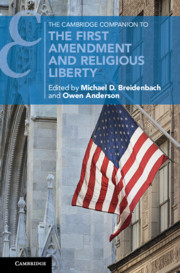Book contents
- The Cambridge Companion to the First Amendment and Religious Liberty
- Cambridge Companions to Law
- The Cambridge Companion to the First Amendment and Religious Liberty
- Copyright page
- Dedication
- Contents
- Notes on Contributors
- Acknowledgments
- Introduction
- Part I Philosophical Foundations
- Part II Historical Interpretations
- Part III Law, Politics, and Economics
- 9 Religious and Secular Presuppositions in First Amendment Interpretations
- 10 Two Concepts of Religious Liberty
- 11 The Economic Origins of Religious Liberty
- 12 Corporate Religious Liberty and the Culture Wars
- 13 Which Original Meaning of the Establishment Clause Is the Right One?
- 14 The Two Separations
- 15 The Challenge Ahead
- Index
11 - The Economic Origins of Religious Liberty
from Part III - Law, Politics, and Economics
Published online by Cambridge University Press: 17 December 2019
- The Cambridge Companion to the First Amendment and Religious Liberty
- Cambridge Companions to Law
- The Cambridge Companion to the First Amendment and Religious Liberty
- Copyright page
- Dedication
- Contents
- Notes on Contributors
- Acknowledgments
- Introduction
- Part I Philosophical Foundations
- Part II Historical Interpretations
- Part III Law, Politics, and Economics
- 9 Religious and Secular Presuppositions in First Amendment Interpretations
- 10 Two Concepts of Religious Liberty
- 11 The Economic Origins of Religious Liberty
- 12 Corporate Religious Liberty and the Culture Wars
- 13 Which Original Meaning of the Establishment Clause Is the Right One?
- 14 The Two Separations
- 15 The Challenge Ahead
- Index
Summary
Societies embracing religious liberty have been comparatively rare in human history. Political rulers possess strong incentives to control the spiritual marketplace, whereas the clergy of a dominant faith will seek state protection to prevent rival groups from challenging their hegemony. With a close affinity for church-state unity, why would any nation liberalize laws and allow greater freedoms for religious minorities? In contrast to explanations that focus on a shifting ideational landscape, this chapter argues that reasons for the rise of religious liberty can be found in the economic incentives facing political leaders. When deregulating the religious market enhances revenue collection, economic growth, and bolsters needed immigration, governments will reduce restrictions on religious minorities. Colonial America remained divided as to whether religious liberty was a good idea, but the economic necessities facing a new nation led to passage of the First Amendment.
Keywords
- Type
- Chapter
- Information
- Publisher: Cambridge University PressPrint publication year: 2020



